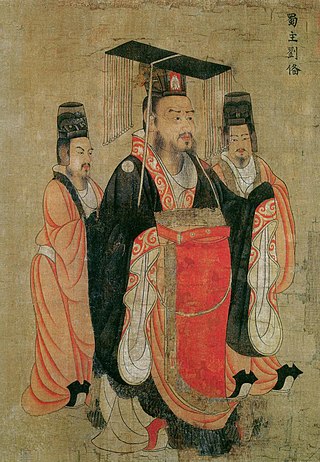
Liu Bei, courtesy name Xuande (玄德), was a Chinese warlord in the late Eastern Han dynasty who later became the founding emperor of Shu Han, one of the Three Kingdoms of China. Although he was a distant relative of the Han imperial family, Liu Bei's father died when he was a child and left his family impoverished. To help his mother, he sold shoes and straw mats. When he reached the age of fifteen, his mother sent him to study under Lu Zhi. In his youth, Liu Bei was known as ambitious and charismatic. He gathered a militia army to fight the Yellow Turbans. Liu Bei fought bravely in many battles and grew famous for his exploits. Later, he participated in the coalition against Dong Zhuo, following this joined his childhood friend Gongsun Zan and fought under him against Yuan Shao.

Zhuge Liang, also commonly known by his courtesy name Kongming, was a Chinese statesman, strategist, and engineer who lived through the end of the Eastern Han dynasty and the early to mid-Three Kingdoms period (220–280) of China. During the Three Kingdoms period, he served as the Imperial Chancellor of the state of Shu Han (221–263) from its founding in 221 and later as regent from 223 until his death in September or October 234.
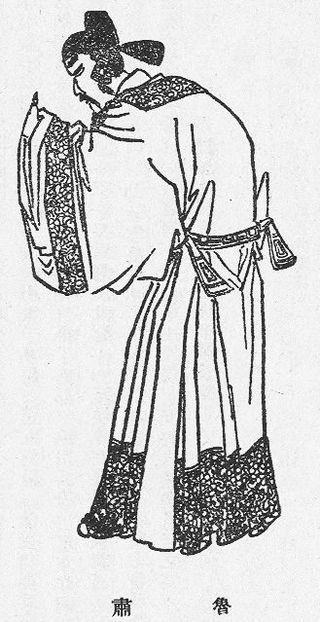
Lu Su (172–217), courtesy name Zijing, was a Chinese military general and politician serving under the warlord Sun Quan during the late Eastern Han dynasty. In the year 200, when Sun Quan had just taken over the reins of power, his adviser Zhou Yu recommended Lu Su as a talent to Sun Quan. As one of Sun Quan's most important advisers in the warlord's early career, Lu Su is best known for making some significant contributions. Firstly, in 200 he drafted a long-term strategy for Sun Quan's power bloc to emerge as one of three major contending powers in China – a plan similar to Zhuge Liang's Longzhong Plan, which was proposed about seven years later. Secondly, before the Battle of Red Cliffs in late 208, he was the first person to persuade Sun Quan to ally with Liu Bei against Cao Cao. Thirdly, he succeeded Zhou Yu as the frontline commander of Sun Quan's forces in 210 after Zhou's death and maintained the Sun–Liu alliance. Fourthly, in 215, he represented Sun Quan at the negotiations with Liu Bei's general Guan Yu during the Sun–Liu territorial dispute over Jing Province.
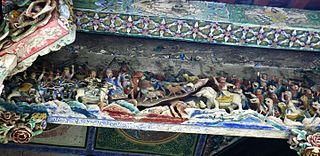
Zhuge Liang's Southern Campaign, also known as the War of Pacification in Nanzhong, was a military campaign which took place in 225 during the early Three Kingdoms period (220–280) of China. It was led by Zhuge Liang, the Imperial Chancellor of the state of Shu Han, against opposing forces in the Nanzhong region. The campaign was a response to rebellions started by local governors in the Nanzhong region and intrusions by the Nanman.

Chen Shou, courtesy name Chengzuo (承祚), was a Chinese historian, politician, and writer who lived during the Three Kingdoms period and Jin dynasty of China. Chen Shou is most known for his most celebrated work, the Records of the Three Kingdoms (Sanguozhi), which records the history of the late Eastern Han dynasty and the Three Kingdoms period. Chen Shou wrote the Sanguozhi primarily in the form of biographies of notable persons of those eras. Today, Chen's Records of the Three Kingdoms is part of the Twenty-Four Histories canon of ancient Chinese history.

Zhuge Liang's Northern Expeditions were a series of five military campaigns launched by the state of Shu Han against the rival state of Cao Wei from 228 to 234 during the Three Kingdoms period in China. All five expeditions were led by Zhuge Liang, the Imperial Chancellor and regent of Shu. Although they proved unsuccessful and ended up as a stalemate, the expeditions have become some of the best known conflicts of the Three Kingdoms period and one of the few battles during it where each side fought against each other with hundreds of thousands of troops, as opposed to other battles where one side had a huge numerical advantage.

Ma Liang (187–222), courtesy name Jichang, was an official serving under the warlord Liu Bei during the late Eastern Han dynasty of China. Since he was young, Ma Liang was famous for his exceptional talent, with Chen Shou describing him as one of Shu's best officials. However, he was killed in battle at the age of 35 years during the Battle of Xiaoting. He served in the state of Shu Han as one of the founding emperor Liu Bei's Palace Attendants during the early Three Kingdoms period and was the elder brother of Ma Su.
Li Yan, courtesy name Zhengfang, also known as Li Ping, was a military general of the state of Shu Han during the Three Kingdoms period of China. He climbed to the zenith of his career when he was asked by the Shu emperor Liu Bei to be the military paramountcy and co-regent alongside Zhuge Liang for his son and successor, Liu Shan. After the death of Liu Bei, Li Yan was given the rank of General of the Vanguard which was last held by Guan Yu back in 220. Li served most of his career in the mid and late 220s as the area commander for the Eastern Front centered in Yong An with Chen Dao as his deputy; he never faced any major battles in his position. However, during the 230s and the 4th of Zhuge Liang's Northern Expeditions, Li Yan was given a higher rank of General of the Agile Cavalry, below only Zhuge Liang. He was assigned to handle logistics, but he was unable to deliver supplies to Zhuge Liang's army in a timely manner. After his attempt to fraudulently cover his inability to follow commands, Li Yan was stripped from positions and power.
Zhang Yi, courtesy name Junsi, was an official of the state of Shu Han in the Three Kingdoms period of China.
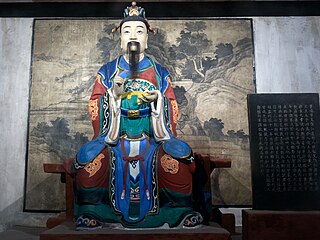
Fei Yi, courtesy name Wenwei, was a Chinese diplomat, military general, politician, and regent of the state of Shu during the Three Kingdoms period of China. Born in the late Eastern Han dynasty, Fei Yi started his career as an attendant to Liu Shan, the eldest son and heir apparent of Liu Bei, a warlord who became the founding emperor of Shu. After Liu Shan became emperor in 223, Fei Yi gradually rose to prominence under the regency of Zhuge Liang, the Imperial Chancellor of Shu. During this time, he concurrently served as a military adviser under Zhuge Liang and as Shu's ambassador to its ally state Wu. He also played a significant role in the conflict between the Shu general Wei Yan and Zhuge Liang's chief clerk Yang Yi. After Zhuge Liang's death in 234, Fei Yi served as a deputy to the new regent Jiang Wan and progressively assumed greater responsibilities as Jiang Wan gradually relinquished his powers due to poor health. In 244, Fei Yi led Shu forces to victory at the Battle of Xingshi against their rival state Wei and succeeded Jiang Wan as regent of Shu two years later following the latter's death. On the first day of the Chinese New Year in 253, Fei Yi was assassinated by a Wei defector, Guo Xiu.
Huang Quan, courtesy name Gongheng, was a Chinese military general and politician of the state of Cao Wei during the Three Kingdoms period of China. He previously served under the warlords Liu Zhang and Liu Bei during the late Eastern Han dynasty and in the state of Shu Han during the early Three Kingdoms period before defecting to Cao Wei. Liu Bei relied heavily on Huang Quan for counsel in both domestic and foreign policy. Under the Wei government, however, Huang Quan was restricted to only internal affairs because even though the Wei emperor Cao Pi appreciated him for his talent, he doubted Huang Quan's allegiance and believed he was still secretly loyal to Liu Bei.
Yan Jun, courtesy name Mancai, was an official of the state of Eastern Wu during the Three Kingdoms period of China.

Dong Yun, courtesy name Xiuzhao, was a Chinese general and politician of the state of Shu Han during the Three Kingdoms period of China. His father, Dong He, also served as an official in Shu. Dong Yun was one of four persons who held positions equivalent to a head of government in Shu from 221 to 253; the other three were Zhuge Liang, Jiang Wan and Fei Yi.
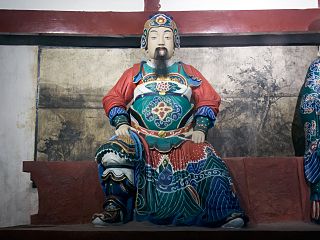
Deng Zhi, courtesy name Bomiao, was a government official, diplomat and military general of the state of Shu Han during the Three Kingdoms period of China. A descendant of Deng Yu, Deng Zhi started his career in the late Eastern Han dynasty under the warlord Liu Bei as a low-level officer in Pi County. After Liu Bei discovered his talent, Deng Zhi steadily rose through the ranks to become a county prefect and later a commandery administrator and imperial secretary. In 223, the Shu regent Zhuge Liang sent him as Shu's envoy to meet Sun Quan, the ruler of Shu's ally state Wu, and reestablish the Wu–Shu alliance against their common rival state Wei. Deng Zhi succeeded in his mission and earned praise from Sun Quan for strengthening Wu–Shu ties. In 227, Deng Zhi became a military general and he participated in the first Shu invasion of Wei by leading a decoy force with Zhao Yun to distract the Wei general Cao Zhen. Although they lost the battle, Deng Zhi and Zhao Yun managed to rally their troops to put up a firm defence during their retreat and minimise their losses. Following Zhuge Liang's death in 234, Deng Zhi rose to higher general ranks and was stationed in present-day Chongqing for about 10 years before he was recalled back to the Shu capital Chengdu in his 70s to serve as General of Chariots and Cavalry. In 248, he suppressed a rebellion in Fuling. He died in 251.
Zhuge Qiao (204–228), courtesy name Bosong, was an official of the state of Shu Han in the Three Kingdoms period of China. He was the adopted son of Zhuge Liang, the Imperial Chancellor and regent of Shu from 223 to 234. His biological father was Zhuge Liang's elder brother Zhuge Jin, a military general of Shu's ally state, Eastern Wu.
Liao Li, courtesy name Gongyuan, was an official of the state of Shu Han during the Three Kingdoms period of China.
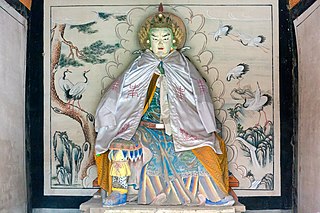
Yang Yi, courtesy name Weigong, was an official of the state of Shu Han in the Three Kingdoms period of China.
Zhang Wen (193–230), courtesy name Huishu, was a Chinese military general and politician of the state of Eastern Wu during the Three Kingdoms period of China.
Yang Xi, courtesy name Wenran, was an official of the state of Shu Han during the Three Kingdoms period of China. He is best known for writing the Ji Han Fuchen Zan, a collection of praises of notable persons who served in the Shu Han state. Chen Shou, the third-century historian who wrote the Records of the Three Kingdoms (Sanguozhi), extensively quoted and annotated Yang Xi's collection.

Yang Hong, courtesy name Jixiu, was an official of the state of Shu Han during the Three Kingdoms period of China.












